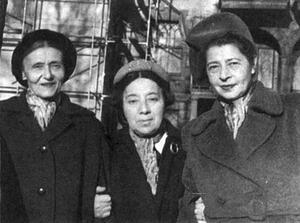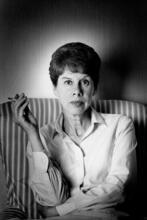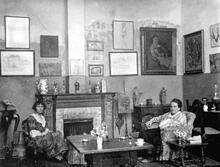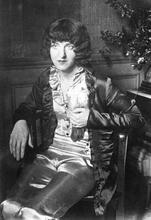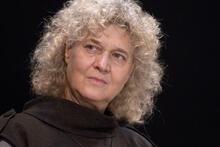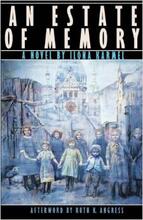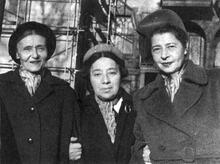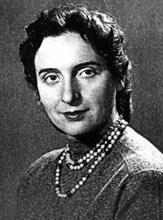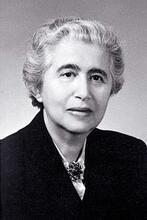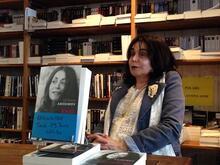Dvoyre Fogel
Dvoyre Fogel was born in Ukraine in 1902 to a Polish-speaking family. Fogel studied philosophy in Vienna and Polish literature in Krakow, receiving her PhD in 1926. While at university, Fogel became active in Yiddish literary circles and wrote articles for local Yiddish journals and Polish journals. She published two books of Yiddish poetry—Tog-Figurn (1930) and Manekinen (1934)—and a book of short sketches, Akatsyes Bliyen (1935), in both Polish and Yiddish. She was a member of the circle of major Polish avant-garde Unist visual artists. The artistic philosophy of Unism influenced Fogel’s work, eliminating all emotional expression in favor of a disciplined unity of color and form. Together with her husband and son, Fogel was killed in the Lwów ghetto in 1942.
Introduction
“The law of boredom is merciless,” wrote Dvoyre Fogel, a Yiddish writer of poetry, prose, and literary and art criticism, in the manifesto that opens her first book of poetry. Fogel’s remarkable experimental poetry, all written in the 1930s, was, in the spirit of early twentieth-century art, radically avant-garde and attuned to all the modernist minimalisms. She attempted to fuse modern art and poetry in a new style that she termed “white words,” striving, as she put it, to create a new lyric poetry of the urban condition: a poetry of cool stasis and of geometric ornamentation with a rhythm of repetition that can replace melodiousness and dynamism, in which monotone becomes theme. In her creative prose she employed repetitive detached impressions (“montages”) to achieve the same goals. Contemporaneous and later critics considered her style too intellectual, studied, and obscure, and lacking in traditional Jewish and feminine thematics. Yet Fogel herself regarded her project not as a deliberate experiment, but rather as “a necessity, achieved and paid for with life’s experience.”
Personal Life and Family
Dvoyre Fogel (sometimes referred to as “Debora Vogel”) was born in 1902 in Burshtyn (Galicia, now Ukraine) in a non-observant, Polish-speaking home. Her father, Anshel Fogel, who died in the 1930s, was a Hebraist and the director of the Baron de Hirsch school in Burshtyn and later of the Lwów (Lemberg) Jewish orphanage. Her mother, who came from a distinguished family, was the sister of Dr. Marcus Ehrenpreis, Chief Rabbi of Sweden (1914–1951), and served as headmistress of a Jewish vocational school in Lwów. Dvoyre’s only sister died in infancy.
During World War I the family fled to Vienna and later moved to Lwów, where Fogel spent most of her life. She graduated from the Lwów Jewish gymnasium, where she was active in the Zionist youth movement Ha-Shomer ha-Za’ir and studied philosophy in Vienna and Polish literature in Cracow, receiving her PhD in 1926. Her doctoral dissertation charts the influence of Hegel’s aesthetics upon Jozef Kremer (1806–1875), philosopher and scholar of aesthetics and art history. Fogel taught psychology at a Hebrew teachers’ college in Lwów. In 1932 she married a Lwów architect and engineer named Barenblit. Her only son, Anshel, was born in 1937. Together with her husband and son, Fogel was killed in the Lwów ghetto in 1942.
Polish and Yiddish Literary Works
While at the university Fogel wrote German poetry but gradually became familiar with Yiddish literature and began to write in that language, although it was not spoken in her home. She became active in Yiddish literary circles and wrote articles for various local Yiddish journals as well as for the Polish journals Sygnaty and Wiadmosci Literackie. She participated in the short-lived Lwów Yiddish journal of literature and art Tsushtayer (1929–1931), contributing a two-part essay on the art of Marc Chagall and other art reviews, besides her own poems and essays on poetry. She published two books of Yiddish poetry—Tog-Figurn (Day-Figures, 1930) and Manekinen (Mannequins, 1934)—and a book of short sketches, Akatsyes Bliyen (Acacias Bloom, 1935) in both Polish and Yiddish. Her poems, prose and essays appeared in New York, in the Introspectivist monthly journal Inzikh (1936, 1937, 1938) and in the quarterly Bodn (1937).
Unism and the Polish Avant-Garde
Fogel traveled extensively in Europe and was part of the vibrant Polish modernist scene of the interwar period. She was a member of the circle of major Polish avant-garde visual artists such as Stanislaw Witkiewicz (Witkacy) (1885–1939) and Wladislaw Strzeminski (1893–1952), who founded an approach to art known as Unism. One of Strzeminski’s lithographs, exhibited in Łódź in 1938, bears her name (“Debora Vogel”). Strzeminski’s artistic philosophy clearly influenced Fogel: Unism eliminated all emotional expression in favor of a disciplined unity of color and form. Through Witkiewicz (who painted her portrait), Fogel in c. 1930 became acquainted with the Polish Jewish writer and artist Bruno Schulz of Drohobycz (1892–1942), who was as yet unpublished. The two developed a close relationship and carried on an intensive correspondence; marriage was discussed but opposed by her family. Fogel, one of the editors of Tsushtayer, included art by Schulz and a review of his work in the journal’s second issue (June 1930). In 1930, during a visit to her uncle in Stockholm, she published an article on him. It was Fogel who encouraged Schulz to develop the lyrical postscripts to his letters, passages that became the basis for his first publication “Cinnamon Shops” (1934), published in English as “Street of the Crocodiles.” Schulz wrote a review in Polish of her prose. Ironically, Fogel is better known today for her connection with Schulz than for her own unique and innovative poetic vision.
Selected Works by Dvoyre Fogel
Poetry
“You are Light and Bowing.” Tsushtayer 1, 37 (1929).
Day-Figures. Warsaw-Lemberg: 1930.
Mannequins. Warsaw-Lemberg: 1934.
“Legend of Silver.” Inzikh 11 (1935): 196–197.
Prose
Acacias Bloom. Warsaw-Lemberg: 1935.
“Fragments of a Montage-Novel.” Inzikh 25 (1936): 27–29.
“Fragments of a Montage-Novel.” Inzikh 30 (1936): 177–178l.
“Chapter from a Montage.” Inzikh 32 (1937): 61–63.
“Chapter from a Montage.” Inzikh 33 (1937): 90–91.
“Military Parade.” Inzikh 47 (1938): 154–156.
Essays
“Theme and Form in the Art of Chagall.” Tsushtayer 1, 21–26 (1929).
Tsushtayer 2 (1930): 19–24.
“‘White Words’ in Poetry.” Tsushtayer 3 (1931): 42–48.
“Stasis, Dynamics and Contemporaneity in Art.” Inzikh 27 (1936): 75–8.
“The Literary Genre of Montage.” Bodn 3:3–4 (1937): 99–105.
Bikel, Shloyme. “Dvoyre Fogel’s ‘White Words.’” In Writers of My Generation (Yiddish). Tel Aviv: 1965, 128–132.
Birnbaum, Jacob and Eliahu Shulman (eds.). Lexicon of the New Yiddish Literature (Yiddish), vol. 7. New York: 1968, 287–289.
Donajski’s Digital Gallery. Wladislaw Strzeminski. www.ddg.art.pl/strzeminski/catalogue_III.html. 1997.
Ficowski, Jerzy, ed. Letters and Drawings of Bruno Schulz with Selected Prose. New York: 1988, 16, 23–24; 242, n. 2.
Ficowski, Jerzy. Regions of the Great Heresy: Bruno Schulz’s Biographical Portrait. New York: 2003, 62–68.
Kants, S., ed. Bursztyn Book (Hebrew). Tel Aviv: 1960, 173–176.
Lyubas, Anastasiya. “Die Geometrie des Verzichts: Deborah Vogel's poetry, essays, and letters in a new German translation and compilation.” In geveb (March 2018).
Meltzer, Shimshon. “Dvora Fogel.” In By the Rivers (Hebrew). Tel Aviv: 1976; Oyerbakh, Rochl. “Unspun Threads” (Yiddish). Di Goldene Keyt 50 (1964), 131–143.
Ravitsh, Melekh. “Dvoyre Fogel.” In My Lexicon (Yiddish). Montreal: (1942) 1945, 188–190.
Sadan, Dov. “Acacias Bloom.” In Sadan, Dov. Threshold Stones: Essays on Yiddish Writers (Hebrew). Tel Aviv: 1952, 225–231.

